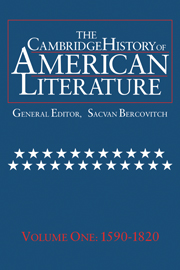Book contents
- Frontmatter
- Introduction
- THE LITERATURE OF COLONIZATION
- NEW ENGLAND PURITAN LITERATURE
- BRITISH-AMERICAN BELLES LETTRES
- THE AMERICAN ENLIGHTENMENT, 1750–1820
- THE LITERATURE OF THE REVOLUTIONARY AND EARLY NATIONAL PERIODS
- 1 Letters of the Early Republic
- 2 Magazines, Criticism, and Essays
- 3 The Drama
- 4 Poetry
- 5 The Novel
- 6 Charles Brockden Brown
- 7 Washington Irving
- 8 James Fenimore Cooper
- Chronology
- Bibliography
- Index
3 - The Drama
from THE LITERATURE OF THE REVOLUTIONARY AND EARLY NATIONAL PERIODS
Published online by Cambridge University Press: 28 March 2008
- Frontmatter
- Introduction
- THE LITERATURE OF COLONIZATION
- NEW ENGLAND PURITAN LITERATURE
- BRITISH-AMERICAN BELLES LETTRES
- THE AMERICAN ENLIGHTENMENT, 1750–1820
- THE LITERATURE OF THE REVOLUTIONARY AND EARLY NATIONAL PERIODS
- 1 Letters of the Early Republic
- 2 Magazines, Criticism, and Essays
- 3 The Drama
- 4 Poetry
- 5 The Novel
- 6 Charles Brockden Brown
- 7 Washington Irving
- 8 James Fenimore Cooper
- Chronology
- Bibliography
- Index
Summary
In 1826, at the opening ceremonies of New York's Bowery Theater, a speaker voiced the hope that “the latent talents of some native Bard may here be warmed into existence, who shall emulate the growing fame, acquired in other walks, by Irving and Cooper.” The statement reveals a conspicuous truth about the early American drama. As Western culture entered its Romantic phase, the American theater could not boast a single figure of international stature, a playwright who could stand comparison with the new Republic's leading fiction writers. The nearest America came to a world-famous dramatist in 1826 was John Howard Payne, a transplanted New Yorker whose adaptations of French hits played to full houses at London's Drury Lane; today, Payne is little more than a footnote to literary history.
The American drama was the most republican and propagandistic of the literary genres. Slow to accommodate the individualism that became synonymous with nineteenth-century authorship, it failed to develop Romantic talents of the highest rank. One might object that the nineteenth century, the age of the novel's apotheosis, proved remarkably inhospitable to Western playwriting generally. Although this may be an accurate appraisal, at least until the last quarter of the century, it remains true that the complex of assumptions governing the native stage was singularly uncongenial to the nurturing of Romantic inwardness and self-realization. The drama of the early Republic was intimately tied to the civic sphere. It retained a commitment to the common good long after fiction and poetry (or rather, the fictions and poems considered canonical) had modified or shed such loyalties for more private goals.
- Type
- Chapter
- Information
- The Cambridge History of American Literature , pp. 573 - 590Publisher: Cambridge University PressPrint publication year: 1994

